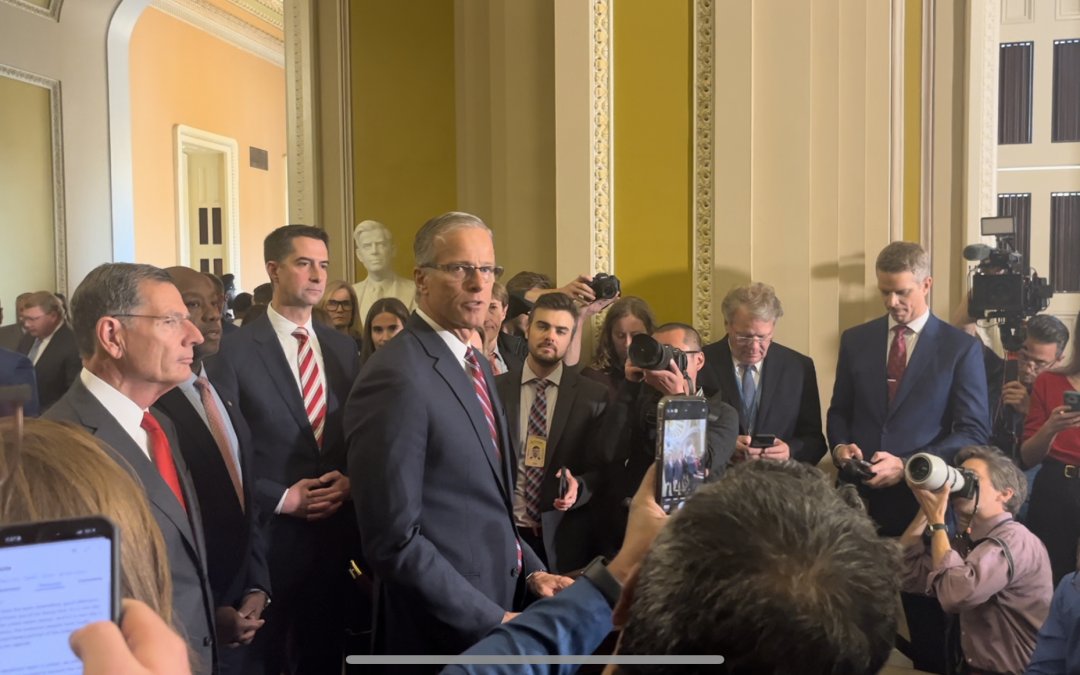WASHINGTON – Republican Senators elected South Dakota’s John Thune to be their new Majority Leader on Wednesday morning, marking an end to Mitch McConnell’s 17-year stint atop the Senate Republican Conference.
Thune defeated Senator John Cornyn’s (R-Texas) and Senator Rick Scott’s (R-Fla.) bids for the post. After Scott was eliminated on the first ballot, Thune narrowly defeated Cornyn 29-24 on the second ballot.
Scott had gained momentum among President-elect Donald Trump’s most loyal supporters in recent days, as X owner Elon Musk, political commentator Tucker Carlson and former presidential candidates Vivek Ramaswamy and Robert F. Kennedy Jr. all publicly backed his candidacy. Yet, with Senators casting their ballots in secret, a majority ultimately chose to entrust the more experienced Thune, currently the second-ranking Senate Republican behind McConnell.
“It’s a new day in the United States Senate. It’s a new day in America,” Thune said at a press conference following the vote. “The American people have loudly rejected the failed policies of the Biden-Harris-Schumer agenda.”
Thune pledged stronger border security, streamlining government bureaucracy and restoring American energy dominance as his top agenda items. “We have a mandate from the American people,” he said. “A mandate not only to clean up the mess left by the Biden-Harris-Schumer agenda but also to deliver on President Trump’s priorities.”
Thune confirmed that he did not intend to change the legislative filibuster in the Senate, which requires a bill to receive 60 votes in order to pass.
Republicans also chose a new slate of Senate leaders under Thune, electing John Barrasso (R-WY) to the number two spot as the party whip in the chamber. Other incoming party leaders include Tom Cotton (R-Ark.), who was elected Republican Conference Chair, and Tim Scott (R-SC), who was elected National Republican Senatorial Committee (NRSC) chair.
Tim Scott, whose role places him in charge of raising money for Republican Senate candidates, said his eyes were already on 2026. “My passion is making sure that we defend our current seats, expand the map and expand our majority so that President Trump does not have two years with a Republican majority in the Senate — he has four years,” Scott said.
The reaction to Thune’s election from Democratic Senators was largely positive, with many praising the South Dakota Senator’s personal character while expressing disappointment over having lost the majority.
Current Majority Leader Chuck Schumer (D-N.Y.) congratulated Thune on his victory at a later press conference, urging the incoming Republican Senate to collaborate on bipartisan legislation. “Senator Thune and I have done lots of things together in a bipartisan way here in the Senate,” Schumer said. “I strongly believe that bipartisanship is the best and often the only way to get things done around here.”
Schumer said his focus before losing the majority was on ensuring the government was funded by the December deadline, passing a National Defense Authorization Act, securing disaster aid funding and confirming new judicial appointments.
Senator Joe Manchin, the outgoing West Virginia Independent known for frequently bucking the Democrats who he caucused with, told Medill News Service the outcome of the Majority Leader vote was “excellent” and called Thune a “beautiful person.”
Colorado Democratic Senator John Hickenlooper, meanwhile, said Thune is a “skilled leader” and expressed optimism that the new Congress would be able to reach bipartisan agreement on issues such as regulation of artificial intelligence.
Republicans are expected to hold a 53-47 majority in the Senate, which includes an Associated Press race call that Republican David McCormick defeated Democratic Senator Bob Casey in Pennsylvania. McCormick, a former hedge fund manager, currently holds a roughly 30,000-vote edge and has claimed victory, but Casey has yet to concede. McCormick attended the leadership vote today.
Vice President-elect JD Vance also made an appearance at the leadership vote, greeting reporters with a “good morning” as he walked toward the old Senate chamber. Vance declined to publicly endorse a candidate, despite several significant figures in the Trump administration backing Rick Scott.
Schumer will hand over the gavel to Thune on January 3, 2025, when the 119th Congress is sworn in.

